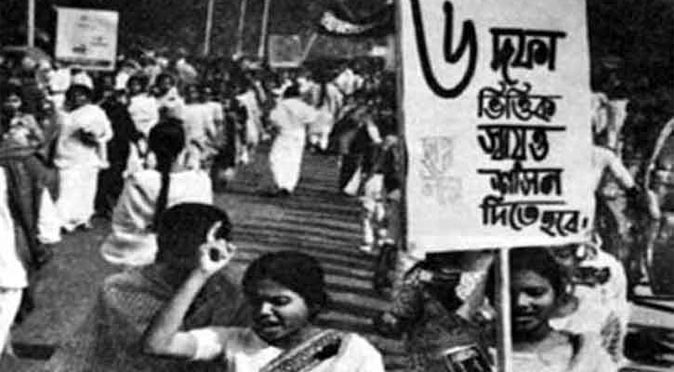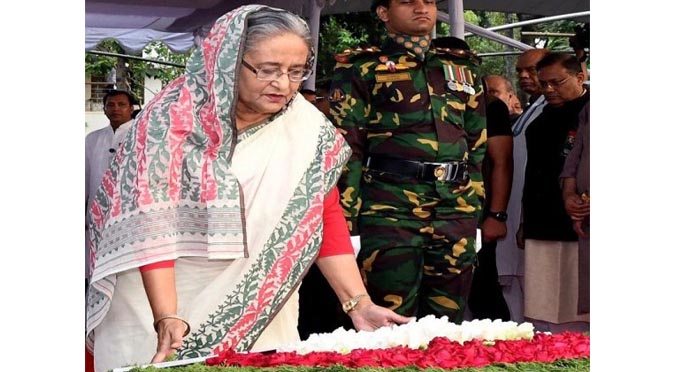Historic six points
The charter of independence announced by Bangabandhu Sheikh Mujibur Rahman on 7 June 1966

The historic importance of the Six Points movement is not reflected in its full glory in the conventional syllabus of Bangladesh’s education system. Moreover, students are seldom able to comprehend the magnitude and massive impact which the Six Points had in the independence of a nation like Bangladesh. The root of this movement goes back to June 7th of 1966. It was on this day that the people of East Pakistan united together to implement a general strike to support the Six Points programme presented by the Awami League leader Bangabandhu Sheikh Mujibur Rahman.

The primary reason behind the announcement of the Six Points by Bangabandhu in Lahore was to initiate a firm stand against the socio-political and economic disparity brought upon the East Pakistanis by the West Pakistani political and military leaders. After a long period of sufferings of the people of East Pakistan, Bangabandhu Sheikh Mujibur Rahman acted in response. He could very well understand the real desire of his fellow countrymen and could read the pulse of the people of East Pakistan. Finally, when the dam of patience ruptured, he decided to announce the Six Points in order to protect the vast resources and wealth generated from East Pakistan. Since the creation of Pakistan in 1947, West Pakistanis created Rawal Pindi as the hub of civil and military rule over both wings. As a result, all the wealth of the country used to go to Pindi though East Pakistan used to earn nearly 70% of the foreign currency through export of jute, tea, hide and other products.
Now, it is a question whether Bangladesh would have won its independence if there was no Six Points. Most historians would say no. Six Points gave the last blow to the very foundation of Pakistan,created on the basis of religion, which was an impractial concept. Because of religion it was impossible to unite the nation. As it became weak it remained vulnerable and could not sustain. Sheikh Mujib was the only leader who opposed it and organised a strong movement. Only he had the charisma to unite 7.5 crore people and imbibe them to join the Liberation War for the ultimate goal of independence. Bangladesh was created.
State Bank of Pakistan used to be controlled by West Pakistan rulers. It was at a time like this Bangabandhu announced the Six Points and it came at the most needed hour. He boldly pointed out the inequalities before the face of mighty military dictator Ayub Khan when nobody dared to say anything. The opposition leaders of West Pakistan looked at Mujib's Six-point Programme as a device to disband Pakistan, and hence they rejected his proposal outright. The Ayub government projected Sheikh Mujib as a separatist and later instituted a case against him, which they termed-AGARTALA CONSPIRACY CASE. He was arrested and put on trial. The case led to widespread agitation in East Pakistan culminating into the mass uprising of early 1969. Under public pressure, the government was forced to release him unconditionally on 22 February 1969. The Awami League sought public mandate in favour of the Six Points Programme in the general elections of 1970 in which Sheikh Mujib received the absolute mandate from the people of East Pakistan in favour of his Six-point. But Zulfiqar Ali Bhutto refused to join the session of the National Assembly scheduled to be held on 3 March 1971 unless a settlement was reached between the two leaders beforehand. Sheikh Mujibur Rahman and his party sat in a protracted dialogue from 15 March 1971. The dialogue failed to produce any positive result. The army crackdown of 25 March sealed the fate of Pakistan. Birth of Bangladesh was ineveitable. Now, it is a question whether Bangladesh would have won its independence if there was no Six Points. Most historians would say no. Six Points gave the last blow to the very foundation of Pakistan,created on the basis of religion, which was an impractial concept. Because of religion it was impossible to unite the nation. As it became weak it remained vulnerable and could not sustain. Sheikh Mujib was the only leader who opposed it and organised a strong movement. Only he had the charisma to unite 7.5 crore people and imbibe them to join the Liberation War for the ultimate goal of independence. Bangladesh was created.

Six Points Programme
1: The Constitution should provide for a Federation of Pakistan in its true sense on the Lahore Resolution, and the parliamentary form of government with supremacy of a Legislature directly elected on the basis of universal adult franchise.
2: The federal government should deal with only two subjects: Defence and Foreign Affairs, and all other residuary subjects shall be vested in the federating states.
3: Two separate, but freely convertible currencies for two wings should be introduced; or if this is not feasible, there should be one currency for the whole country, but effective constitutional provisions should be introduced to stop the flight of capital from East to West Pakistan. Furthermore, a separate Banking Reserve should be established, and separate fiscal and monetary policy be adopted for East Pakistan.
4: The power of taxation and revenue collection shall be vested in the federating units and the federal centre will have no such power on the issue. The federation will be entitled to a share in the state taxes to meet its expenditures.
5: There should be two separate accounts for the foreign exchange earnings of the two wings; the foreign exchange requirements of the federal government should be met by the two wings equally or in a ratio to be fixed; indigenous products should move free of duty between the two wings, and the Constitution should empower the units to establish trade links with foreign countries.
6: East Pakistan should have a separate militia or paramilitary force.



